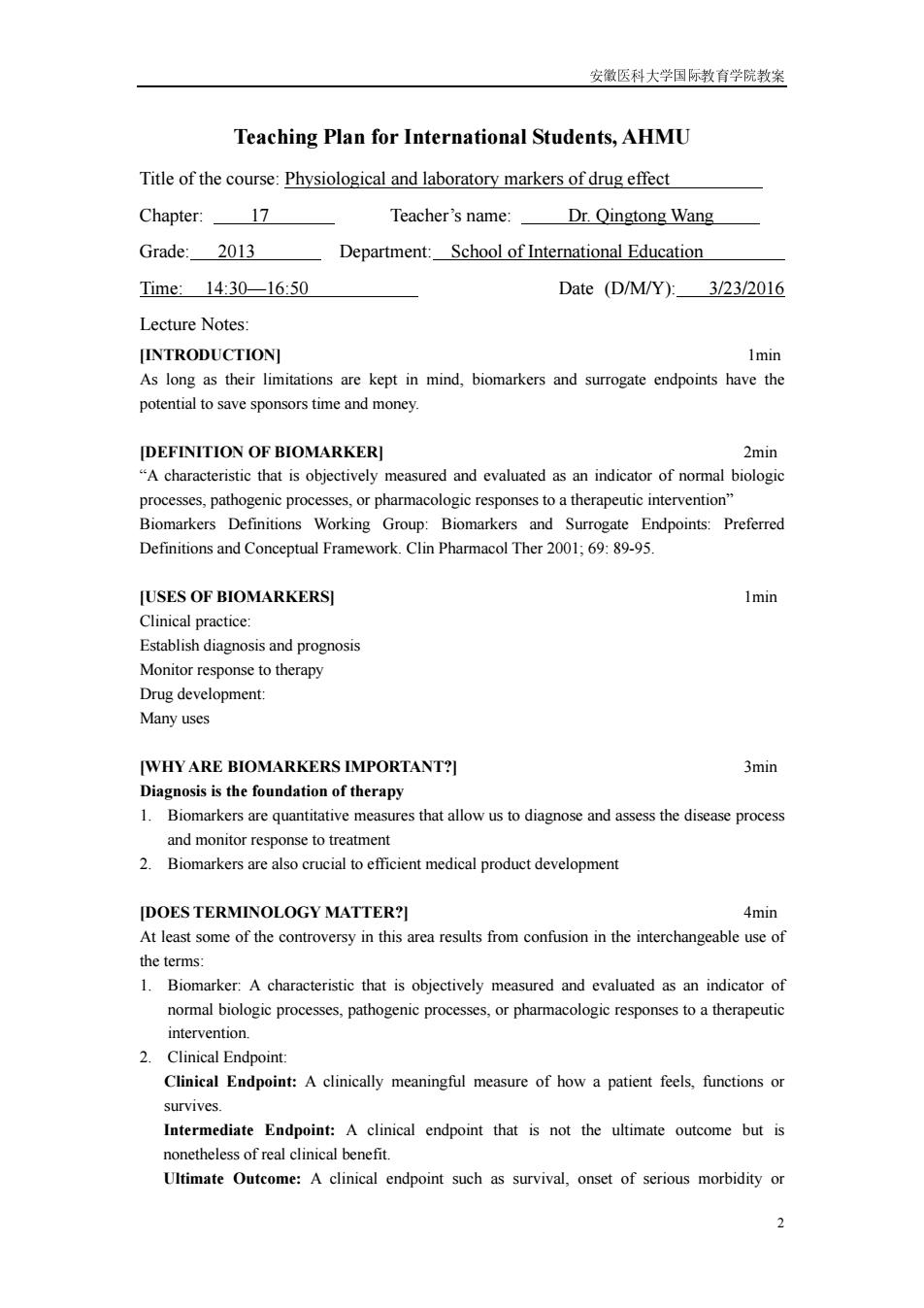正在加载图片...

安徽医科大学国际教育学院教案 Teaching Plan for International Students,AHMU Title of the course:Physiological and laboratory markers of drug effect Chapter: 17 Teacher's name: Dr.Qingtong Wang Grade:2013 Department:School of International Education Time:14:30-16:50 Date (D/M/Y): 3/23/2016 Lecture Notes: [INTRODUCTION] 1min As long as their limitations are kept in mind,biomarkers and surrogate endpoints have the potential to save sponsors time and money. [DEFINITION OF BIOMARKER] 2min "A characteristic that is objectively measured and evaluated as an indicator of normal biologic processes,pathogenic processes,or pharmacologic responses to a therapeutic intervention" Biomarkers Definitions Working Group:Biomarkers and Surrogate Endpoints:Preferred Definitions and Conceptual Framework.Clin Pharmacol Ther 2001;69:89-95. JUSES OF BIOMARKERS] Imin Clinical practice: Establish diagnosis and prognosis Monitor response to therapy Drug development: Many uses [WHY ARE BIOMARKERS IMPORTANT?] 3min Diagnosis is the foundation of therapy 1.Biomarkers are quantitative measures that allow us to diagnose and assess the disease process and monitor response to treatment 2.Biomarkers are also crucial to efficient medical product development DOES TERMINOLOGY MATTER? 4min At least some of the controversy in this area results from confusion in the interchangeable use of the terms: 1.Biomarker:A characteristic that is objectively measured and evaluated as an indicator of normal biologic processes,pathogenic processes,or pharmacologic responses to a therapeutic intervention. 2.Clinical Endpoint: Clinical Endpoint:A clinically meaningful measure of how a patient feels,functions or survives. Intermediate Endpoint:A clinical endpoint that is not the ultimate outcome but is nonetheless of real clinical benefit. Ultimate Outcome:A clinical endpoint such as survival,onset of serious morbidity or 2安徽医科大学国际教育学院教案 2 Teaching Plan for International Students, AHMU Title of the course: Physiological and laboratory markers of drug effect Chapter: 17 Teacher’s name: Dr. Qingtong Wang Grade: 2013 Department: School of International Education Time: 14:30—16:50 Date (D/M/Y): 3/23/2016 Lecture Notes: [INTRODUCTION] 1min As long as their limitations are kept in mind, biomarkers and surrogate endpoints have the potential to save sponsors time and money. [DEFINITION OF BIOMARKER] 2min “A characteristic that is objectively measured and evaluated as an indicator of normal biologic processes, pathogenic processes, or pharmacologic responses to a therapeutic intervention” Biomarkers Definitions Working Group: Biomarkers and Surrogate Endpoints: Preferred Definitions and Conceptual Framework. Clin Pharmacol Ther 2001; 69: 89-95. [USES OF BIOMARKERS] 1min Clinical practice: Establish diagnosis and prognosis Monitor response to therapy Drug development: Many uses [WHY ARE BIOMARKERS IMPORTANT?] 3min Diagnosis is the foundation of therapy 1. Biomarkers are quantitative measures that allow us to diagnose and assess the disease process and monitor response to treatment 2. Biomarkers are also crucial to efficient medical product development [DOES TERMINOLOGY MATTER?] 4min At least some of the controversy in this area results from confusion in the interchangeable use of the terms: 1. Biomarker: A characteristic that is objectively measured and evaluated as an indicator of normal biologic processes, pathogenic processes, or pharmacologic responses to a therapeutic intervention. 2. Clinical Endpoint: Clinical Endpoint: A clinically meaningful measure of how a patient feels, functions or survives. Intermediate Endpoint: A clinical endpoint that is not the ultimate outcome but is nonetheless of real clinical benefit. Ultimate Outcome: A clinical endpoint such as survival, onset of serious morbidity or